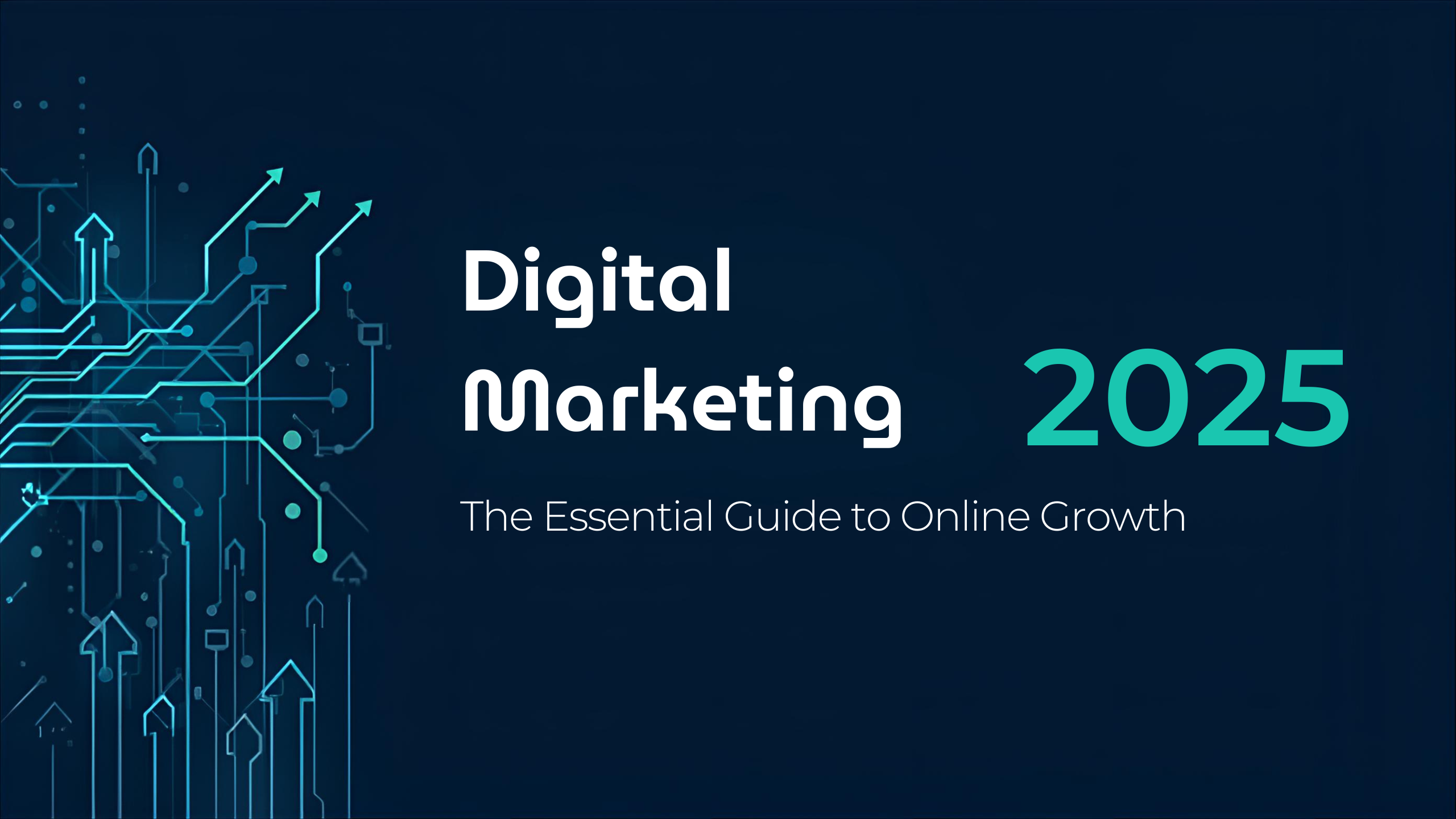Digital Marketing 2025: The Essential Guide to Online Growth
Discover the best digital marketing strategy for 2025 to boost engagement, enhance brand visibility, and drive results for your business effortlessly.

In a world where technology shapes consumer behavior, digital marketing stands as the bridge between businesses and their audiences. As we move deeper into 2025, the marketing landscape is more data-driven, interactive, and competitive than ever. To thrive, brands must harness digital channels not just to promote but to connect, engage, and convert.
What Is Digital Marketing?
Digital marketing is the strategic use of online platforms and technologies to promote products, services, or brands. Unlike traditional marketing methods such as print or TV, digital marketing leverages the power of the internet—search engines, social media, email, and websites—to reach a global audience.
It’s no longer optional. Studies show that over 90% of customers research products online before making a purchase decision. Whether it’s a small startup or a multinational company, digital marketing is the foundation for visibility, engagement, and revenue generation.
Core Components of Digital Marketing
Search Engine Optimization (SEO): The process of improving your website’s visibility on search engines like Google. Proper keyword research, quality content, and backlinks help your site rank higher.
Pay-Per-Click (PPC) Advertising: Paid ads on platforms such as Google Ads or Meta Ads bring instant traffic and measurable results.
Social Media Marketing (SMM): Building brand awareness and community engagement through platforms like Instagram, Facebook, LinkedIn, and X (Twitter).
Content Marketing: Creating valuable blogs, videos, or infographics to inform, educate, or entertain audiences.
Email Marketing: Personalized campaigns nurture leads and improve customer retention.
Influencer Marketing: Collaborating with digital influencers boosts authenticity and reach.
These components, when integrated strategically, form a powerful ecosystem that drives consistent growth.
Why Businesses Depend on Digital Marketing
Digital marketing operates on the pillars of reach, relevance, and return.
Global Reach: The internet connects brands with consumers across borders, enabling small companies to compete globally.
Real-Time Analytics: Platforms like Google Analytics measure engagement, conversion rates, and ROI instantly.
Cost Efficiency: Compared to traditional advertising, online marketing provides scalable budgets with higher conversion potential.
Customer Targeting: Advanced tools help segment audiences based on behavior, interest, and demographic data.
Ultimately, digital marketing allows businesses to work smarter—not just harder—by focusing efforts where they matter most.
Emerging Trends in Digital Marketing 2025
The digital landscape evolves at lightning speed, and 2025 is defined by innovation. Here are the top trends reshaping the industry:
AI-Powered Marketing: Artificial intelligence is revolutionizing personalization. AI tools now predict customer behavior, optimize ad campaigns, and automate responses.
Voice Search Optimization: With voice assistants like Alexa and Siri gaining usage, optimizing for voice queries is key.
Video-First Strategies: Short-form video dominates user attention across YouTube, Instagram Reels, and TikTok.
First-Party Data Focus: With privacy regulations tightening, brands are prioritizing direct data collection through forms, surveys, and loyalty programs.
Augmented Reality (AR) Marketing: AR enhances customer experiences by letting them visualize products before purchase.
Each of these trends reinforces one principle—adaptability is survival in digital marketing.
Building a Digital Marketing Strategy
A winning digital marketing strategy requires a structured approach that aligns with your business goals.
Define Your Audience: Identify your target demographics—age, interests, online habits, and pain points.
Set Clear Objectives: Whether brand awareness or sales generation, every campaign must have a measurable goal.
Conduct Keyword Research: Tools like Ahrefs or SEMrush help uncover high-volume, low-competition keywords relevant to your niche.
Create Quality Content: Engage your audience through blogs, visuals, podcasts, and emails.
Leverage Multiple Channels: Use a mix of SEO, social media, and paid advertising for a balanced approach.
Analyze and Adapt: Track results using analytics and adjust strategies for better performance.
A structured execution combining creativity and analysis transforms digital marketing into a growth engine.
The Role of SEO in 2025
Search Engine Optimization remains the heart of online visibility. In 2025, SEO focuses on three key dimensions—E-E-A-T (Experience, Expertise, Authoritativeness, and Trustworthiness), user experience, and technical structure.
To succeed in SEO today:
Optimize website speed and mobile responsiveness.
Create relevant, keyword-rich, but reader-friendly content.
Earn backlinks from authoritative websites.
Use structured data (Schema markup) for enhanced search appearance.
Focus on local SEO for region-based audiences.
By combining human creativity with AI tools, brands can maintain ranking dominance and long-term trust.
Power of Content Marketing
Content remains the king of digital communication. In 2025, audience engagement depends on delivering personalized, insightful, and emotionally resonant content.
Businesses using storytelling, visual media, and educational resources see higher retention and conversion rates. Interactive formats such as polls, reels, and webinars build trust far better than direct ads.
The formula is simple: educate first, sell later.
Measuring Digital Marketing Success
Effective digital marketing thrives on data. Key performance indicators (KPIs) include:
Website traffic and session duration
Conversion rates
Cost per acquisition (CPA)
Click-through rate (CTR)
Social engagement metrics
Tracking these KPIs empowers marketers to refine future campaigns and ensure sustainable growth.
Challenges in Digital Marketing
Despite its advantages, digital marketing has challenges—algorithm updates, ad fatigue, data privacy, and increasing competition. Success requires constant learning, testing, and innovation.
Brands that focus solely on trends without understanding their audience struggle to maintain authenticity. The key lies in balancing automation with a human touch.
Final Thoughts
As we head further into 2025, digital marketing is the backbone of business growth and global visibility. It’s not about adopting every new tool or trend—it’s about crafting meaningful experiences that inspire trust and loyalty.
A smart digital marketing strategy connects data with creativity, technology with empathy, and brands with people. Whether you’re a startup or an enterprise, embracing digital transformation today secures your relevance tomorrow.

